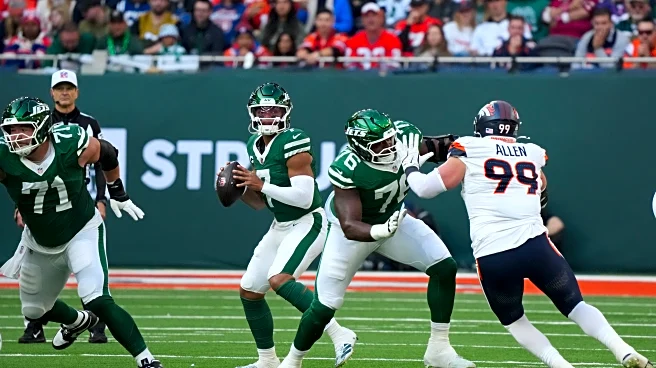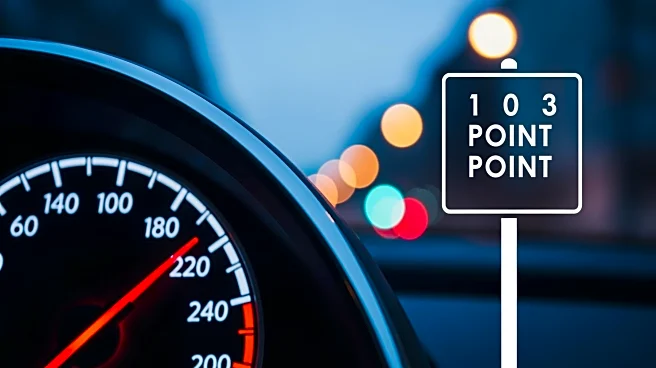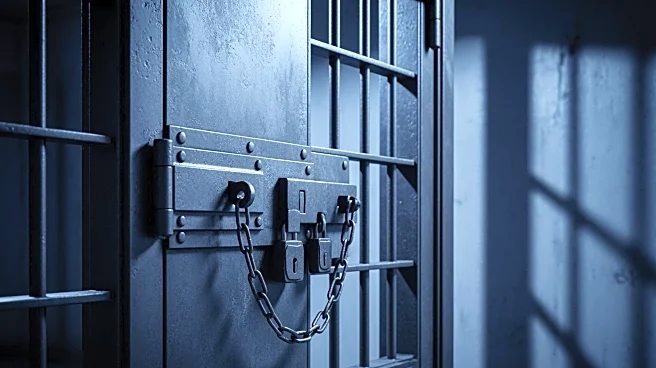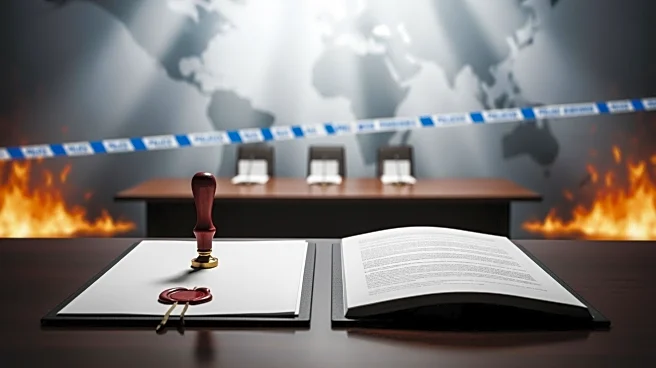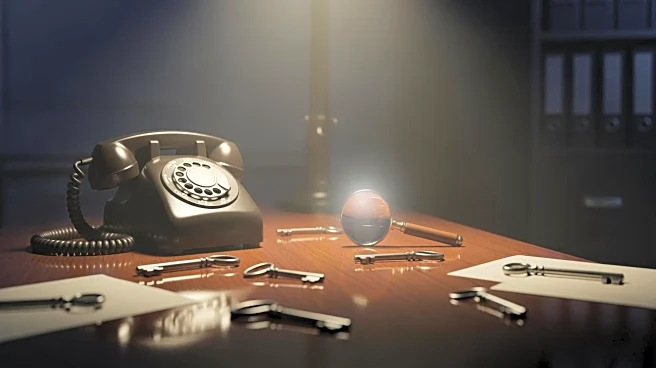Jets quarterback Justin Fields is in the spotlight this week for all the wrong reasons. The Jets fell to the Broncos 13-11 in London in Week 6. Fields finished the game completing only 9 of 17 passes for 45 yards. He took 9 sacks, which led the Jets to finish the game with -10 passing yards. All three Jets scoring drives were aided by great field position. I could go on. I think you have the gist. It was an ugly performance.
So where does this leave us?
How much of it was actually Fields’ fault?
You could be the biggest Justin Fields believer
in the world. When the team finishes a game with negative net passing yardage, the quarterback has to take a heaping portion of the blame.
Particularly frustrating are the relatively simple throws that Fields missed. Take this one from the final Jets offensive drive.
This is a third and eight from the Denver 44. The game is on the line, and the Jets are trying to get the ball to their best receiver. Garrett Wilson goes into motion, which gets him away from Patrick Surtain II.


This not only gets Wilson away from one of the league’s best corners. It gives him a free release at the line of scrimmage and a cushion that makes the short out route he’s running impossible to cover.

This is where Wilson is at the top of Fields’ drop.

Fields just stares it down, though, and throws late. This is where Wilson is at the point the ball is thrown.

Wilson runs out of real estate, and the throw leads him too far upfield. It ends up incomplete.
Despite all of the struggles in the first 59 minutes of the game, the Jets very well might have won the game had Fields hit that pass. It likely would have put the ball into Nick Folk’s range. (On a side note, I was at the game on Sunday. I watched Folk warm up, and kicking to that side of the field, he came up well short trying practice field goals from 57 yards out. So any criticism of Aaron Glenn passing up a 62 yard try after this play is misplaced.) With an on time throw, Wilson might have had enough space to turn it up the field and pick up a big gain. This is just a miss by Fields. Playing quarterback in the NFL is difficult enough without missing the relative layups like this one.
It is important, however, to determine whether the rest of the offense was executing at a high level. Was this the quarterback squandering an otherwise winning effort by the rest of the offense, or was the quarterback part of a broken infrastructure? In this game, I think it is clear it was the latter of the two.
There are plays in which Fields and the rest of the offense must share some of the blame.
Let’s talk about the play which followed the Wilson miss. It’s fourth down now, and the game is on the line. The Broncos are blitzing seven, and off the snap Jonathon Cooper gets around Mason Taylor.


I have to say I’m not wild about Taylor’s alignment in this situation. He’s flexed out a bit. You know it’s likely the Broncos are coming with an all out blitz in this situation, and Taylor will need to pass protect. Sticking him out there means that the rookie who is still quite raw as a blocker won’t have any help inside or outside.

You can also see that nobody’s really open at least beyond the sticks on this fourth down play.

Fields initially escapes Cooper’s pressure but is soon sacked.


Could Fields have felt the pressure sooner and gotten the ball out quickly to Arian Smith, who appears to be his outlet? Sure. Smith is well short of the sticks and will have a defender bearing down on him. Perhaps he can make that guy miss, though, and run upfield for a first down.

After Cooper whiffs, would you like to see Fields just throw it up? It’s a low percentage play, but the game is over anyway if the Jets don’t convert. Maybe you hit a miracle pass or draw a pass interference flag.
You would like for Fields to at least give this play some sort of chance rather than take the sack, but let’s be honest. It’s a long shot. This play was virtually finished from the outset for reasons other than Fields.
That was Denver’s ninth and final sack of the game. Let’s move back now to the first quarter and the initial Denver sack.
It’s second and thirteen, and Fields is back to pass. He’s looking to his right, the tight quarters on the boundary side of the field. There isn’t really anything happening. Garrett Wilson appears to be his primary option. This is a really tight window. I’m not sure it would be well-advised to try and force this ball. It very easily could be coming back as an interception.

Mason Taylor also isn’t going to be open.

Fields looks back to his left. It seems like he sees Josh Reynolds.
Reynolds isn’t really open, but he is working back to a soft spot in the defense he sees.

I think a more seasoned quarterback might see Reynolds breaking to the open spot and wait for him to get there. There’s something about experience that allows you to improvise better even if the play goes a little bit off the original script.

You can get on Fields for this if you’d like. I personally won’t. I think we know who Fields is at the moment. He’s not a master pocket passer right now. I wouldn’t expect him to make a play like this. We know that one of his current weaknesses is that he tends to hesitate the deeper into his reads he gets like a lot of quarterbacks.
I will get on him for one aspect of this play, though. He has a wide open run lane. If he tucks it and runs, he can gain positive yardage.

Instead he gives up ground, bounces outside, and is eventually chased down.


This is one where Fields is probably less to blame than the initial miss to Wilson we discussed but more than the ill-fated fourth down to end the game. It’s not like this was a gimme where his primary read was wide open, but there was an opportunity to turn it into a positive by running it. The more I watch Fields, the more he frustrates me as a runner. He’s obviously very talented when he tucks the ball and runs, but his decision making on when to run can be rather erratic.
Then there are some plays that just are outright not Fields’ fault.
There isn’t much a quarterback can do when the left tackle protecting his blindside gets beaten this cleanly off the snap as Olu Fashanu was a on critical third down in the fourth quarter.
Unfortunately the Jets had a situation where both the quarterback and the rest of the offense were both playing poorly. The poor play from the two elements reinforced each other and created a true cycle of doom.
Should Fields be benched?
I can’t say for sure because a lot of the answer to that question can only be determined by his mental state at the moment.
We’ve seen it a lot with this team. When the quarterback hits a rough patch, and the team loses games things can snowball. The quarterback becomes a lightning rod for criticism in the media and fanbase and completely loses his confidence. He starts making mistakes he wouldn’t otherwise make.
I don’t know where Fields’ head is at the moment. If he’s at the point where he could use a mental break, the Jets should start Tyrod Taylor against the Panthers.
If Fields is still in a relatively good place, though, I would lean in the direction of starting him.
I do believe Fields’ play has been poor enough to make a benching justified. That isn’t the only factor to consider, though. The easiest things in the world to do are to bench the player who isn’t performing and fire the coach of the struggling team/unit.
The question is whether there’s actually an option that will improve the team.
If the biggest complaint about Fields is that he holds the ball for too long and takes too many bad sacks, I’m not sure Tyrod Taylor is the solution.
Some might say, “Anything would be an upgrade on -10 net passing yards.” That treats -10 passing yards as the likely outcome. Say what you will about Fields (and to date he just hasn’t played at a high enough level in his career). That performance against the Broncos is an outlier.
While Fields has not been good enough to hold down a starting job in his career, his performance has typically been better than what we have seen with the Jets. His current QBR of 36.5 is well below even the 46.9 he posted with the Bears in 2023, which was the performance that made Chicago give up on him.
One thing that has been true of Fields through his career is that his lows are very low, but his highs are pretty high. He is not even at 50 career starts, yet he has 11 games where his QBR jumped at least 30 points over the previous game.
The chances are fairly decent that Fields could bounce back with a strong game against the Panthers. Do I have a ton of conviction in that statement? No, thing could remain quite bad, particularly with Garrett Wilson out of the lineup. Still, I am inclined to believe a Fields bounceback much more likely than Taylor engineering a strong game.
Zooming out a bit.
I think one area of the discussion where the temperature needs to come down a bit in the fanbase is Fields’ contract. The Jets gave Fields a $20 million salary.
To hear it from some corners of the fanbase, you would think this is a franchise-altering deal. In reality, Fields isn’t even making two-fifths of the going rate for a franchise level quarterback. The Jets are paying him the type of money a low end number one receiver might get.
Now to be clear, the Jets are still getting poor value for this deal at this point. Still I don’t think the degree of rage is proportional to the actual impact.
This was the situation. The Jets needed somebody to play quarterback this year, and there weren’t any good options.
They could go with a low end veteran starter with minimal upside like Jameis Winston or Gardner Minshew. The other option was an upside play. You could try to become the next team to find a reclamation project like Sam Darnold. You’d look for a former first round pick with flashes of high end play. Given his ability as a rusher, and one-third of his previous starts resulting in a passer rating of 95 or higher, I would argue that Fields was a reasonable upside play.
The other option was Daniel Jones. Now you could look at Jones’ exceptionally hot start and conclude the Jets chose poorly. That’s fair, but there are a couple of other factors involved. First, they would have had to convince Jones to return to New York, a city full of bad memories for him. I’m not sure that’s what Jones would choose given the option he had to go with the Colts. Infrastructure also matters. The Colts are built better than the Jets are. It’s not clear at all that Jones would be having the same success with the Jets that he is with the Colts. I mean in the preseason, there was buzz about the Jets potentially trading for Alec Pierce to be their number two receiver. Pierce is the number four option in Indianapolis’ passing game (targets per game).
If you want to say the Jets would have been better off saving their money and rolling with Winston…Well you know what? I think you’re right.
I have a feeling, though, that had the Jets gone in the direction of the low upside veteran, we would be getting a lot of complaints about the team not even trying to add a quarterback with upside. That’s how it was in 2017 when the Jets rolled with Josh McCown. (I should know. I was one of the people complaining. Sorry, Josh.)
Maybe you want to argue the Jets should have drafted Jaxson Dart. We can return to that in a couple of years. I’m not ready to go there after two wins as a starting quarterback. Dart is an interesting prospect, but he’s no sure thing at this point.
Maybe it would have been a better move for the Jets to save their money. I will say this, though. After all of the treasure lost in 2023 and 2024 in the team’s futile attempts to buy a Super Bowl around Aaron Rodgers, one of the four smallest veteran quarterback contracts in the league shouldn’t be such a lightning rod for criticism.
About this offense.
When a team chooses a quarterback with pretty clear and pronounced flaws, I expect that team to do everything in its power to limit those flaws from exposing themselves.
The other day I asked myself a simple question. Despite his clear physical ability and his flashes of high end play, why hasn’t Justin Fields been able to establish himself as a legitimate starting quarterback?
The answers to this are numerous and complex, but two really stuck out in my mind.
- The deeper into progressions the defense forces him to get, the more hesitancy he plays with.
- He is hesitant to throw the ball to receivers unless he clearly sees them break open.
These are not minor flaws. Nor are they easy to fix.
After all, the top quarterbacks in the league are the ones who can make the complex reads. And windows open and close so quickly in the NFL, that to win from the pocket a quarterback frequently has to throw before a wide receiver is open. This is to say nothing of other tight window throws that need to be made.
Fields will not be a successful quarterback in this league until this improves.
But I must ask one question. What are the Jets doing to help him avoid these weaknesses to the fullest extent possible?
I know this will come off as critical, but the job the Jets did with the wide receiver position this offseason was baffling to me.
If your quarterback has a tough time getting deep into reads and has an aversion to throwing to receivers before they break open, the objective should be to load the offense with receivers who create quick separation.
I fully acknowledge the Jets had very limited resources this offseason. The team robbed Peter’s salary cap space to pay Paul the previous two years in their failed attempt to load up around Aaron Rodgers the previous two seasons. Everything could not be prioritized. The Jets chose to try and fortify their offensive line. I agreed with that strategy.
Still, it’s tough to believe this is what they ended up with at wide receiver. Allen Lazard, Tyler Johnson, and Josh Reynolds all might be good locker room guys. I’m guessing they are. The Jets underwent a youth movement this offseason, and the few veterans who stayed and/or were brought in are considered good influences for young players.
With that said, I’m not sure I see the need for all three of these players. At best, this is a trio of backup level receivers who should only see the field in case of injury. There’s also a plausible case that these guys are really at the level of street free agents who a team decimated by injuries might sign if it needs a veteran capable of learning a playbook quickly.
Entering this season, Reynolds was widely believed to be the number two receiver. This is a guy who had 13 catches for two teams a year ago and was waived in season. Only twice in an eight year career was he even his team’s third leading receiver.
But it goes beyond quality issues. None of Lazard, Johnson, or Reynolds was ever considered a quick separator.
The only other wide receiver the Jets have getting playing time is Arian Smith. Smith is a fourth round rookie. Consensus big boards suggested he was a massive reach at that spot. Consensus big boards are not always right, but we’ve seen little to prove they were wrong about. Smith would likely best be served getting reps on the practice field at this point on the back of the roster, if not the practice squad.
The Jets didn’t have much money to spend on wide receiver this offseason, but they should have been scouring the market looking for value guys with upside capable of separating quickly. They may have lacked every other ability. Maybe the guys the Jets could afford wouldn’t be big, overly fast, or dynamic after the catch. If they could quickly create space, they would have value and at least be a match with what Fields needs.
That brings me to discussing the run game. Part of the idea in bringing Fields in was supposed to be that his ability as a runner could at least to some extent make up for his limitations as a passer.
Fields had almost 11 rushing attempts per game in his best season of 2022. In 2025 he hasn’t run the ball more than 7 times since Week 1.
I also have to say there isn’t a lot of creativity in the way the Jets use Fields as a runner. You get the occasional zone read from the shotgun.

On this play Fields reads an unblocked defender and either hands the ball to Breece Hall or pulls it and breaks outside depending on how the defenders reacts. This is a fine play and should be utilized, but it’s close the full extent of the Jets’ playbook with Fields as a runner. Against Denver, every non-scramble rushing attempt Fields had was either a zone read or a quarterback sneak.
(Side note. While we’re on the topic of the Jets not properly building an offense around Fields’ skillset, I want to note that the team refuses to use the tush push on short yardage plays. Fields is built for that. But even beyond that, the Jets were one of ten teams to vote against banning it last offseason. Why did they vote to keep it legal if they didn’t plan to take advantage of it with Fields? It really feels at times in this franchise like the right hand isn’t talking to the left.)
Let’s compare this with a couple of run concepts Baltimore has shown with Lamar Jackson. Here you’ve got Zay Flowers running in motion from left to right. The Buffalo defense needs to be aware of a pop pass to him so he draws focus.

The handoff is then angled to the offense’s right, which draws the defender, and makes it an easy pull and run for Jackson reversing field. This is compared with the Jets fake run up the middle or quarterback pull outside.


I’ll give you video on this just so you can see how the eye candy of Flowers’ motion and the angle of the handoff get Bills defenders moving in the wrong direction.
On this play, the option the unblocked guy has to defend is a pitch to wide receiver Zay Flowers.



Here a fake handoff to a motioning Flowers throws a bunch of Dallas defenders out of position and opens up a lane for Jackson to pick up an easy gain.
If you want to have Fields at quarterback at this point, you need to lean on the run. To do that, an offense has to be creative in the run game. You can’t run the same basic NFL plays over and over. Defenses are too good and too sophisticated for that. You need to give them a lot of different options to think about and figure out new wrinkles to stress them and force mistakes.
Right now it seems like Tanner Engstrand’s idea of being creative in the run game is putting Max Mitchell on the field as a sixth offensive lineman with Jeremy Ruckert and Mason Taylor in a jumbo package and slam the ball into the line with Breece Hall. (And by the way, one way to jump start a quarterback who is struggling throwing is to pass occasionally out of a formation that makes the defense expect a run.)
On the topic of Breece Hall, it’s tough to believe that he did not have a target in the Week 6 loss to the Broncos. The Jets lack receiver talent anyway, and Hall is dangerous with the ball in space. In a game where the blitz was constantly getting home, and Fields seemed baffled, it defies logic that the Jets didn’t adjust and make screens to Hall a staple of the offense. I know there’s an argument that Fields doesn’t throw screens well. I have to say, in a game where the plays the Jets actually called resulted in -10 net passing yards, the argument that they shouldn’t call a play because Fields might struggle to execute it is a tough one to make.
I want to be clear. Justin Fields has to take the blame for his flaws. You can only blame other people for so long. Fields is in his fifth year in the league with his fourth coaching staff on his third team. At some point his failures are on him.
At the same time, Fields did not fall out of the sky. This Jets coaching staff made him their number one priority this offseason. I don’t understand why you would make Fields such a priority if you weren’t going to build a roster or an offense that builds on what he does well and avoids what he doesn’t.
That’s at the essence of quarterback development.
Even if you’ve disagreed with everything you’ve read so far, I’m about to make a statement you will agree with.
Justin Fields is nowhere near Patrick Mahomes’ level as a quarterback.
Mahomes will go down as an immortal at the position. Even he admitted he didn’t understand how to read defenses when he first started out in the NFL. This was a point where he won the MVP. How did he do it? Well, on that Kansas City team his first two options on a given play were likely to be Tyreek Hill and Travis Kelce in some order. The Chiefs also had an exceptionally designed offense that schemed guys open and provided easy big gains on screen and packaged plays. Then there were the moments when Mahomes’ other worldly ability took over.
Slowly Mahomes learned how to run an offense, and turned into the master field general he is today.
If even the immortal Mahomes needed time to acclimate himself in an NFL offense, Fields is going to have some flaws. I have no idea whether Justin can actually overcome them. What I do know is the best path forward is building brick by brick.
Run the plays he can execute, and have him work on the stuff he can’t. Perhaps he slowly by slowly can learn the nuances of progressions and gradually get more comfortable with throwing with anticipation and into tight windows. In the mean time, make sure you have receivers who get open quickly, and put together a diverse run game.
That’s how it should be.
The reality right now for the Jets is much different. Fields isn’t showing improvement. The personnel isn’t what he needs, and the system isn’t suited for him. Nobody can escape blame for that.
For everybody’s sake, things had better change quickly.
